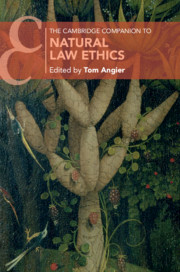Book contents
- The Cambridge Companion to Natural Law Ethics
- Other Volumes in the Series of Cambridge Companions
- The Cambridge Companion to Natural Law Ethics
- Copyright page
- Contents
- Contributors
- Introduction
- Part I The History of Natural Law Ethics
- 1 The Stoics
- 2 Aquinas
- 3 Grotius and Pufendorf
- Part II The Revival of Natural Law Ethics
- Part III Natural Law Ethics and Religion
- Part IV Applied Natural Law Ethics
- Part V Natural Law Ethics
- References
- Index
- Other Volumes in the Series of Cambridge Companions (continued from page ii)
2 - Aquinas
from Part I - The History of Natural Law Ethics
Published online by Cambridge University Press: 21 October 2019
- The Cambridge Companion to Natural Law Ethics
- Other Volumes in the Series of Cambridge Companions
- The Cambridge Companion to Natural Law Ethics
- Copyright page
- Contents
- Contributors
- Introduction
- Part I The History of Natural Law Ethics
- 1 The Stoics
- 2 Aquinas
- 3 Grotius and Pufendorf
- Part II The Revival of Natural Law Ethics
- Part III Natural Law Ethics and Religion
- Part IV Applied Natural Law Ethics
- Part V Natural Law Ethics
- References
- Index
- Other Volumes in the Series of Cambridge Companions (continued from page ii)
Summary
The account of the natural law given by Thomas Aquinas has two claims to the title ‘natural’. First, the basic precepts of the natural law are naturally known, that is, they are accessible to us by the nature of our human minds. Second, the human good depends upon our nature. Philosophical inquiry, for instance, is part of the human good because of the nature of our minds. If we had the minds of squirrels, then philosophical inquiry would be alien to the human good.
For Aquinas, these two aspects of the natural law are intimately linked by way of natural inclinations. To possess a true nature – and not merely some abstract mathematical ‘nature’ – is to move towards certain ends. This natural movement or impetus Aquinas calls a ‘natural inclination’, not to be confused with an inborn desire.
- Type
- Chapter
- Information
- The Cambridge Companion to Natural Law Ethics , pp. 31 - 50Publisher: Cambridge University PressPrint publication year: 2019
- 2
- Cited by

